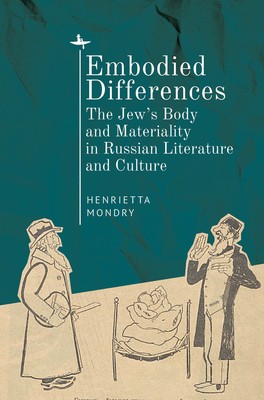
- We will send in 10–14 business days.
- Author: Henrietta Mondry
- Publisher: Academic Studies Press
- ISBN-10: 1644694859
- ISBN-13: 9781644694855
- Format: 15.6 x 23.4 x 1.6 cm, hardcover
- Language: English
- SAVE -10% with code: EXTRA
Reviews
Description
This book analyzes the ways in which literary works and cultural discourses employ the construct of the Jew's body in relation to the material world in order either to establish and reinforce, or to subvert and challenge, dominant cultural norms and stereotypes. It examines the use of physical characteristics, embodied practices, tacit knowledge and senses to define the body taxonomically as normative, different, abject or mimetically desired. Starting from the works of Gogol and Dostoevsky through to contemporary Russian-Jewish women's writing, broadening the scope to examining the role of objects, museum displays and the politics of heritage food, the book argues that materiality can embody fictional constructions that should be approached on a culture-specific basis.
EXTRA 10 % discount with code: EXTRA
The promotion ends in 20d.09:09:53
The discount code is valid when purchasing from 10 €. Discounts do not stack.
- Author: Henrietta Mondry
- Publisher: Academic Studies Press
- ISBN-10: 1644694859
- ISBN-13: 9781644694855
- Format: 15.6 x 23.4 x 1.6 cm, hardcover
- Language: English English
This book analyzes the ways in which literary works and cultural discourses employ the construct of the Jew's body in relation to the material world in order either to establish and reinforce, or to subvert and challenge, dominant cultural norms and stereotypes. It examines the use of physical characteristics, embodied practices, tacit knowledge and senses to define the body taxonomically as normative, different, abject or mimetically desired. Starting from the works of Gogol and Dostoevsky through to contemporary Russian-Jewish women's writing, broadening the scope to examining the role of objects, museum displays and the politics of heritage food, the book argues that materiality can embody fictional constructions that should be approached on a culture-specific basis.


Reviews